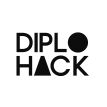Outcome
Stockholm Initiative for Digital Diplomacy – brief summary
On 16–17 January 2014, some 20 diplomats and experts gathered for a 24-hour conference and workshop – a diplohack – on digital diplomacy.
The Stockholm Initiative for Digital Diplomacy (SIDD) was the first major international meeting about digital diplomacy, and the main aim was to bring together some of the world leaders in the field, establish a network and exchange experiences. Participants from Sweden, Finland, the UK, the US, Italy, Brazil, Turkey, France, the United Arab Emirates, Kosovo and the European External Action Service (EEAS) attended.
In a rapidly changing world where technology has altered social structures and working methods, it is important for organisations to explore new methods and processes. For this reason, one important interim target of this meeting was to explore the new forms of cooperation and innovation that this diplohack introduced. The group identified a large number of ideas and challenges that need to be looked at further. Perhaps the most important outcome was that the participants decided that SIDD should be established as an ongoing working group to help develop digital diplomacy in a joint forum. In other words, the primary aim of the group will not be to teach digital diplomacy, but rather to develop it. It was also agreed that the group would be expanded to involve more actors. How the group is broadened and developed will depend to a large extent on the topics on the agenda of future meetings. The working group will be known as SIDD.
The participants agreed that another meeting should be held within six months. The next meeting does not necessarily have to take place in Stockholm. Future meetings could also be held digitally.
This was a first meeting, with broad issues surrounding digital diplomacy up for discussion. The meeting was very much about getting to know one another, sharing experiences and laying the foundations for future work. It was proposed that the next meeting have a more specific focus – such as digital diplomacy in crises, hotspots and humanitarian disasters. Another possible theme could be mentorship between officials in different foreign services.
Between meetings, the work of SIDD will continue using Facebook as a communication channel. There are two concrete tasks that the group will now tackle. Firstly, gathering experiences and creating a joint document with general tips on how foreign services, and other actors, can use digital diplomacy effectively in their work. Secondly, producing a joint definition of what digital diplomacy means and what it involves.
Work has begun.
On 16–17 January 2014, some 20 diplomats and experts gathered for a 24-hour conference and workshop – a diplohack – on digital diplomacy.
The Stockholm Initiative for Digital Diplomacy (SIDD) was the first major international meeting about digital diplomacy, and the main aim was to bring together some of the world leaders in the field, establish a network and exchange experiences. Participants from Sweden, Finland, the UK, the US, Italy, Brazil, Turkey, France, the United Arab Emirates, Kosovo and the European External Action Service (EEAS) attended.
In a rapidly changing world where technology has altered social structures and working methods, it is important for organisations to explore new methods and processes. For this reason, one important interim target of this meeting was to explore the new forms of cooperation and innovation that this diplohack introduced. The group identified a large number of ideas and challenges that need to be looked at further. Perhaps the most important outcome was that the participants decided that SIDD should be established as an ongoing working group to help develop digital diplomacy in a joint forum. In other words, the primary aim of the group will not be to teach digital diplomacy, but rather to develop it. It was also agreed that the group would be expanded to involve more actors. How the group is broadened and developed will depend to a large extent on the topics on the agenda of future meetings. The working group will be known as SIDD.
The participants agreed that another meeting should be held within six months. The next meeting does not necessarily have to take place in Stockholm. Future meetings could also be held digitally.
This was a first meeting, with broad issues surrounding digital diplomacy up for discussion. The meeting was very much about getting to know one another, sharing experiences and laying the foundations for future work. It was proposed that the next meeting have a more specific focus – such as digital diplomacy in crises, hotspots and humanitarian disasters. Another possible theme could be mentorship between officials in different foreign services.
Between meetings, the work of SIDD will continue using Facebook as a communication channel. There are two concrete tasks that the group will now tackle. Firstly, gathering experiences and creating a joint document with general tips on how foreign services, and other actors, can use digital diplomacy effectively in their work. Secondly, producing a joint definition of what digital diplomacy means and what it involves.
Work has begun.
Media
Youtube summary of #SIDD
http://www.youtube.com/watch?v=ko3B_7MX1_w&feature=youtu.be
Information about #SIDD on the Swedish Ministry of Foreign Affairs web page:
http://www.government.se/sb/d/18138
For pictures on #SIDD please look at our Flickr page:
http://www.flickr.com/photos/utrikesdepartementet/sets/72157639830436813/
Read a great article about #SIDD in Wired:
http://www.wired.co.uk/news/archive/2014-01/20/swedish-diplohack
http://www.youtube.com/watch?v=ko3B_7MX1_w&feature=youtu.be
Information about #SIDD on the Swedish Ministry of Foreign Affairs web page:
http://www.government.se/sb/d/18138
For pictures on #SIDD please look at our Flickr page:
http://www.flickr.com/photos/utrikesdepartementet/sets/72157639830436813/
Read a great article about #SIDD in Wired:
http://www.wired.co.uk/news/archive/2014-01/20/swedish-diplohack
